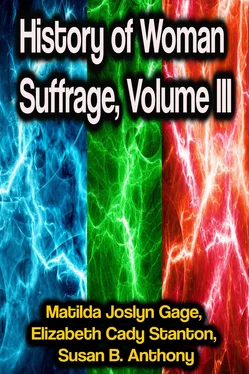The organization of our political institutions is such that the great mass of the powers of government, the proper exercise of which so deeply concerns the welfare of the people, is left to the States. In that depository the will of the people is most certainly ascertained, and the exercise of power is more directly under their guidance. Our free institutions have had their great development and owe their stability more to causes connected with the direct exercise of the power of the people in local self-government than to all other causes combined. Recent events, though tending strongly to centralization, have not destroyed in the public mind the inestimable value of local self-government. Among the powers which have hitherto been esteemed as most essential to the public welfare is the power of the States to regulate their domestic institutions in their own way; and among those institutions none has been preserved by the States with greater jealousy than their absolute control over marriage and the relation between the sexes.
Another power of the States, deemed by the people when they assented to the Constitution of the United States most essential to the public welfare, was the right of each State to determine the qualifications of electors. Wherever the federal constitution speaks of elections for a federal office, it adopts the qualifications for electors prescribed by the State in which the election is to be held.
Nor has this fundamental rule been departed from in the fifteenth amendment. That impairs it only to the extent that race, color, or previous condition of servitude shall not be made a ground of exclusion from the right of suffrage. In all else that pertains to the qualifications of electors the absolute will of the State prevails. This amendment was inserted from considerations which pertain to no other part of the question of suffrage. The negro race had been recently emancipated; it was supposed that the antagonism between them and their old masters and the prejudice of race would be such as to obstruct the equal enjoyment of the rights of freedom conferred by the national forces, and would prevent the white race of the South from admitting the negro race, however deserving it might be, to equal political privileges. And, moreover, it was deemed by the North a point of honor that, having conferred freedom on the negro, he should be provided with the right of suffrage.
None of these considerations applies in the present case. It is not pretended that any such antagonism or prejudice exists between the sexes. It is not pretended that women have been redeemed from an intolerable slavery by the power of the government. It is not pretended that the sex in whose hands is the political power of the States is unwilling, from any cause, to do full justice to the other; for it is conceded that if the proposed amendment should be adopted, its incorporation into the constitution must result from the voluntary action of that sex in which is vested this political power. No good reason has been given why the congress of the United States should force or even hasten the States into such action, and no such reason can be given without a reversal of the theories on which our free institutions are based.
The history given by the majority, of the legislation of the several States in relation to the rights of persons and property of married women showing as it does a steady advance in the abolition of their common-law disabilities, conclusively demonstrates that this question may be safely left for solution where it now is and has always hitherto belonged. The public mind is now being agitated in many of the States as to the rights of women, not only as to suffrage, but as to their engaging in the various employments from which they have hitherto been excluded. This exclusion from certain employments has not been the result of municipal but of social laws—the strongest of all human regulations. As these social laws have been modified, so the sphere of woman's activities and usefulness has been enlarged. These social laws are in the main the groundwork of the exclusion of women from the right of suffrage. In the establishment of these laws, as in their modification, women themselves have even a greater influence than men. Their disability to vote is, therefore, self-imposed; when they shall will otherwise, it is not too much to say that the disability will no longer exist. If in the future it shall be found that these laws deny a right to women the enjoyment of which they desire, and for the exercise of which they are qualified, it cannot be doubted that they will give way. If, on the contrary, neither of these shall be discovered, it will happen that the exclusion of suffrage will not be considered as a denial of a right, but as an exemption granted to women from cares and burdens which a tender and affectionate regard for womanhood refuses to cast on them.
We are convinced, therefore, that the best mode of disposing of the question is to leave its solution to that power most amenable to the influences and usages of society in which women have so large and so potential a share, confident that at no distant day a right result will be reached in each State which will be satisfactory to both sexes and perfectly consistent with the welfare and happiness of the people. Certainly this must be so if the people themselves, the source and foundation of all power, are capable of self-government.
At two of its meetings the committee listened with great pleasure to several eminent ladies who appeared before it as advocates of the proposed amendment. At none of the meetings of the committee, including that at which the members voted on the proposed amendment, was there any discussion of this important subject; none was asked for or desired by any member of the committee, and the vote was taken. The reports of the majority and of the minority of the committee are therefore to be construed only as the individual opinions of the members who respectively concur in them. They are in no sense to be treated as the judgment of a deliberative body charged with the examination of this important subject.
The foregoing leads us to but one recommendation: that the committee should be discharged from the further consideration of the subject, that the resolution raising it be rescinded, and that the proposed amendment be rejected.
J. Z. George,
Howell E. Jackson,
James G. Fair.
In a letter from Miss Caroline Biggs to the president of the National Association the following congratulations came from the friends of suffrage in England:
Central Committee of the National Society for }
Woman Suffrage, 64 Berners Street, London, W. }
At a meeting of the Executive Committee, on May 18, 1882, the following resolution was proposed by Mrs. Lucas, seconded by Miss Jane Cobden, and passed unanimously:
Resolved , That the Executive Committee of the National Society for Woman Suffrage have heard with hearty satisfaction that a select committee of the United States Senate in Washington has passed by a majority of votes the recommendation to adopt a constitutional amendment in favor of women's suffrage. They feel that the cause of woman is one in all countries, and they offer their most cordial congratulations to the women of America on the important step which has just been gained, and their warmest good-wishes for a speedy success in obtaining a measure which will guarantee justice and equal rights to half the population of a sister country.
Nebraska now became the center of interest, as a constitutional amendment to secure the right of suffrage to woman was submitted to be voted upon in the November election. As the submission of such a proposition makes an important crisis in the history of a State, as well as in the suffrage movement, the notes of preparation were as varied as multitudinous throughout the nation, rousing all to renewed earnestness in the work. Both the American and National associations decided to hold their annual conventions in Omaha, the chief city of the State, and to support as many speakers[90] as possible through the campaign, that meetings might be held and tracts distributed in every county of the State, an Herculean undertaking, as Nebraska comprises 230,000 inhabitants scattered over an area of 76,000 square miles, divided into sixty-six counties; and yet this is what the friends of the measure proposed to do. The American Association[91] held its convention September 12, 13, 14. The National[92] continued three days, September 27, 28, 29.
Читать дальше












